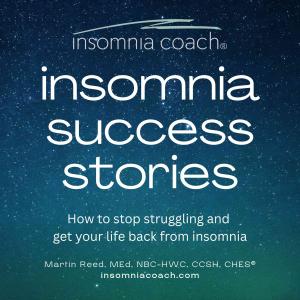Insomnia Coach® Podcast

How Jennifer got through setbacks and relapses while implementing techniques that transformed her sleep after 25 years of insomnia (#23)
Listen to the podcast episode (audio only) Jennifer's insomnia was deeply entrenched. After working with me for four weeks, she felt as though it was becoming more difficult to get through the day, her sleep had not improved, and she was understandably feeling discouraged. However, Jennifer kept going and four weeks later she was happier with her progress. She was experiencing less daytime fatigue and getting more sleep but she was still finding it hard to fall back to sleep when she woke during the night. Again, Jennifer kept going — she continued to implement techniques that build sleep drive, strengthen the body clock, and lower arousal. She began to notice that the quality of her days wasn't completely dependent on how much sleep she got. She stopped striving for sleep, she stopped putting effort into sleep, and she stopped worrying about sleep. In this episode, Jennifer explains how changing her sleep-related thoughts and behaviors not only improved her sleep, but also her quality of life. She shares how she coped with setbacks by focussing on the process rather than progress and tells us about the moment she realized that she knew exactly how to respond to sleep disruption and understood that she was now armed with life-long skills that would enable her to enjoy better sleep for the rest of her life. Click here for a full transcript of this episode.Click here to hide the transcript. Martin Reed: Welcome to the Insomnia Coach Podcast. My name is Martin Reed. I believe that nobody needs to live with chronic insomnia and that evidence-based cognitive and behavioral techniques can help you enjoy better sleep for the rest of your life. Martin Reed: The content of this podcast is provided for informational and educational purposes only. It is not medical advice and is not intended to diagnose, treat, cure, or prevent any disease, disorder, or medical condition. It should never replace any advice given to you by your physician or any other licensed healthcare provider. Insomnia Coach LLC offers coaching services only and does not provide therapy, counseling, medical advice, or medical treatment. The statements and opinions expressed by guests are their own and are not necessarily endorsed by Insomnia Coach LLC. All content is provided "as is" and without warranties, either express or implied. Martin Reed: Thank you so much for taking the time out of your day to come on to the podcast today, Jennifer. Jennifer Ellison: Well, you're welcome. Good to be here. Martin Reed: It's great to have you on. I'm going to just start right at the beginning. Can you just tell us how your sleep problems began, and what you think initially triggered that sleep disruption? Jennifer Ellison: Well, I believe that sleep has always been a bit of a challenge for me. I know even as a child, my parents would talk about that I wasn't a great sleeper. I'm a bit of a worrier by nature. So I know that just being over-focused on sleep or lack of sleep even very early on, was always there for me. I think one of the precipitating events was the birth of my kids and I love my kids, but kids are a challenge when they're little and when you're a young mom and you have to get up three or four times in the night to attend to a child, that throws any mother, any parent's sleep into disarray. Jennifer Ellison: So that certainly happened for me. Then I have two children who are very close in age. So for a while, I had two little children getting up most nights. So it became sort of this ongoing battle with just trying to get any sleep at all with little kids. Then as they became better sleepers, I noticed that I really wasn't becoming a better sleeper again, but again,






 Visit Podcast Website
Visit Podcast Website RSS Podcast Feed
RSS Podcast Feed Subscribe
Subscribe
 Add to MyCast
Add to MyCast